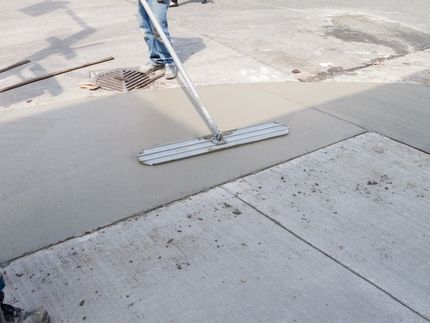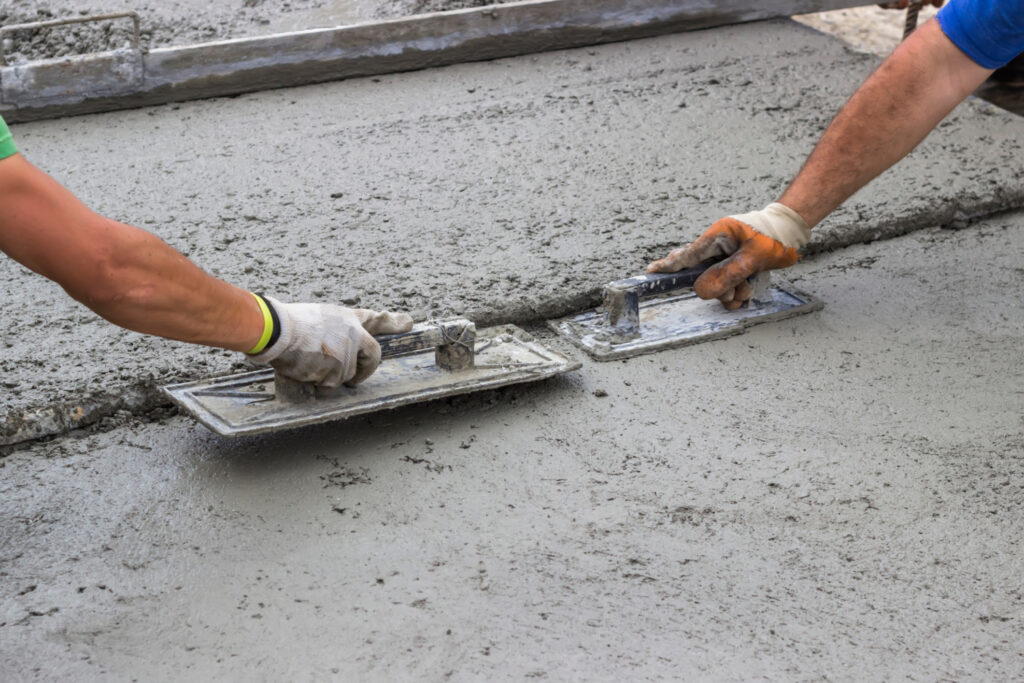Enhance your property with professional services from TJ Concrete Contractor

Comprehending the Important Function of a Concrete Professional in Modern Building and Style
Concrete service providers are vital to the building and style sectors. Their knowledge guarantees that structures are not just long lasting but also aesthetically pleasing. They take part in different obligations, from project intending to quality assurance, and work together with engineers and designers. With developing trends and innovations, their function is extra essential than ever. Understanding their influence can disclose understandings right into modern-day building and construction techniques and the future of structure layout.
The Value of Concrete in Building
Different materials are utilized in construction, concrete remains a keystone of modern building practices due to its adaptability, toughness, and longevity. This composite product, made from concrete, water, and accumulations, can withstand substantial tension and is resistant to fire, weather condition, and bugs, making it ideal for diverse applications. Concrete's flexibility permits it to be molded into numerous sizes and shapes, promoting ingenious architectural designs.
Its thermal mass properties add to energy performance, aiding to manage indoor temperature levels. The widespread schedule of resources and the relatively affordable of concrete additionally improve its allure for massive projects, from business buildings to framework like roads and bridges. As urbanization proceeds to increase, the demand for reliable and sustainable structure products solidifies concrete's necessary duty in building and construction, making it a basic selection for engineers and home builders aiming for long life and resilience in their tasks.
Secret Responsibilities of a Concrete Contractor
Concrete service providers play a necessary function in the construction process, with several vital duties that ensure task success. Their tasks include task preparation and style, material choice and administration, along with maintaining quality assurance and guarantee throughout the task lifecycle. Understanding these obligations is vital for appreciating the professional's influence on building outcomes.
Task Preparation and Layout
When starting on a building and construction task, effective project planning and layout play a vital role in a concrete specialist's responsibilities. The professional has to collaborate closely with engineers, engineers, and clients to recognize the task's objectives and requirements. This involves reviewing website conditions, evaluating layout needs, and identifying the extent of work. A concrete specialist is likewise in charge of establishing budget plans and timelines, guaranteeing that all stages of the job align with total goals. In addition, they must prepare for prospective obstacles and create remedies to preserve job efficiency. By thoroughly developing each element and preparing of the concrete job, the service provider establishes the foundation for effective execution, making sure structural integrity and adherence to security criteria throughout the building process.
Material Option and Management
Effective product selection and administration are vital responsibilities for a concrete contractor, as these decisions directly affect the top quality and sturdiness of the last structure. Concrete contractors need to evaluate different materials, including accumulations, admixtures, and reinforcement types, to ensure they meet task specifications and environmental problems. They must consider elements such as toughness, resistance, and workability to weathering. Additionally, taking care of the supply chain is essential, as timely delivery of products can remarkably affect task timelines. Professionals must keep connections with distributors to protect top quality sources while also monitoring stock degrees to avoid lacks or excesses. Inevitably, this cautious option and management of materials add to the overall success of construction projects and the durability of the structures constructed.
Quality Assurance and Assurance
Quality control and guarantee are extremely important in the building and construction sector, specifically for concrete contractors tasked with delivering reputable and long lasting structures. Concrete service providers must carry out rigorous top quality control procedures throughout the building and construction process, ensuring that all products fulfill specified criteria and laws (Concrete Contractor Near Me). This includes checking the blending, pouring, and healing procedures to prevent defects and enhance architectural honesty. Normal inspections are vital, allowing specialists to determine and rectify issues immediately. Additionally, concrete contractors frequently work together with engineers and engineers to ensure that the end product straightens with style specifications. By sticking to rigid quality control protocols, concrete contractors not only secure the durability of their job but likewise copyright the depend on of customers and stakeholders in the building market
Sorts Of Projects Dealt With by Concrete Service Providers
Concrete service providers are usually connected with large building tasks, their experience expands to a diverse range of applications. These experts are indispensable to domestic jobs, such as foundations, outdoor patios, and driveways, guaranteeing resilience and visual allure. In commercial building, they add to the development of floors, sidewalks, and structural aspects that satisfy particular design and security requirements.
Concrete contractors are included in framework tasks, consisting of bridges, tunnels, and roads, where their skills ensure structural stability and longevity. They likewise play a crucial function in attractive concrete applications, such as stamped concrete and refined surfaces, which enhance the appearance of numerous rooms. Furthermore, their services include fix and maintenance job, addressing issues like breaking or erosion in existing structures. This convenience highlights the necessary function concrete professionals play in both decorative and useful aspects of contemporary construction and design.
Skills and Credentials Required
Concrete service providers have to have a varied collection of abilities and qualifications to properly handle the series of jobs they carry out. Efficiency in concrete blending, putting, and ending up is necessary, as is a solid understanding of numerous types of concrete, consisting of strengthened and decorative alternatives. Knowledge of construction strategies, blueprints, and job monitoring concepts is vital for effective execution.
Physical stamina and stamina are crucial due to the requiring nature of the work. Specialists need to likewise have solid analytic capacities to resolve unforeseen difficulties throughout projects. Communication skills are important for coordinating with customers, engineers, and various other tradespeople.
Furthermore, getting pertinent certifications can enhance a specialist's credibility and expand their career possibilities. Continuous education in new methods and materials keeps specialists competitive in a swiftly developing market. These credentials and abilities jointly enable concrete professionals to provide high-grade results effectively and properly.
The Duty of Concrete Professionals in Safety Compliance
Guaranteeing security conformity is an essential obligation of concrete professionals, as they browse the complexities of construction websites. These experts are tasked with sticking to rigid security regulations and requirements, which are crucial for preventing crashes and making certain the health of all site workers. Concrete Contractor Near Me. Concrete professionals should implement thorough security plans that consist of training personnel on correct equipment usage and safety methods
Additionally, they are liable for checking products and work procedures to recognize prospective threats. By carrying out regular safety and security audits and risk evaluations, concrete professionals can proactively deal with issues prior to they rise. Moreover, they team up with various other construction specialists, such as engineers and job managers, to incorporate precaution into the overall job approach. Inevitably, the commitment of concrete service providers to safety and security conformity not just shields workers however additionally boosts task performance and quality, reinforcing their crucial duty in modern-day construction.
Fads and Innovations in Concrete Design
Recent developments in concrete layout have actually introduced a range of trends and innovations that focus on sustainability and appearances. Sustainable concrete options, ornamental finishing strategies, and wise concrete technologies are improving the market. These advancements not only improve structural stability yet likewise contribute to environmentally responsible building practices.
Lasting Concrete Solutions
As the construction industry increasingly focuses on sustainability, cutting-edge concrete remedies are arising to minimize environmental impact while enhancing performance. One popular trend is using recycled products, such as crushed concrete and commercial by-products, which not only decreases waste yet likewise boosts the concrete's properties. In addition, developments in admixtures, including fly ash and slag, add to reduced carbon exhausts throughout manufacturing. An additional substantial innovation involves the growth of permeable concrete, which allows water to flow through and lowers runoff, minimizing flooding and groundwater exhaustion. Additionally, the surge of carbon capture modern technologies in concrete production holds assurance for more exhausts reduction. These sustainable concrete remedies exhibit the market's commitment to ecologically responsible building and construction methods.

Ornamental Ending Up Strategies
A plethora of ornamental ending up strategies have arised in concrete style, changing simple surfaces into aesthetically striking components. Techniques such as stamping, discoloration, and brightening enable a variety of visual possibilities, accommodating varied style preferences. Stamped concrete mimics natural products like website rock and block, while staining introduces dynamic colors that improve the surface area's allure. Polished concrete, known for its smooth surface, adds elegance to both property and commercial areas. Additionally, microtopping and overlay systems supply cutting-edge alternatives for rejuvenating existing concrete. These strategies not only enhance the visual attributes but likewise enhance longevity and upkeep. As fads progress, the combination of decorative finishes proceeds to play a critical duty in modern-day building, marrying capability with imaginative expression.

Smart Concrete Technologies
While typical concrete continues to be a staple in building, the appearance of clever concrete modern technologies is transforming the industry by integrating innovative functions that boost efficiency and sustainability. These innovations include self-healing concrete, which uses ingrained bacteria that turn on upon cracking, and sensor-equipped concrete that keeps track of architectural health and wellness in real-time. Furthermore, piezoelectric and thermochromic concrete can adjust to ecological changes and generate electrical power, specifically. The execution of environmentally friendly ingredients and recycled products likewise adds to reducing the carbon footprint of concrete manufacturing. As these technologies continue to evolve, they guarantee to boost longevity, lower upkeep costs, and promote greener structure techniques, making them vital for future building tasks. The duty of concrete professionals is increasingly significant in taking advantage of these improvements.
Often Asked Inquiries
What Variables Impact Concrete Prices in Construction Tasks?
Concrete prices in construction jobs is influenced by material costs, labor costs, project size, location, schedule of resources, and market demand. Seasonal aspects and transportation prices can additionally significantly affect the total rates framework.
Exactly How Do Weather Impact Concrete Job?
Weather significantly influence concrete job; extreme temperature levels, humidity, and precipitation can affect setting times, healing procedures, and overall top quality - Concrete Contractor Near Me. Professionals must adjust their approaches and timetables to reduce these ecological influences for successful project completion
What Is the Common Timeline for a Concrete Job?
A regular concrete project timeline varies from a couple of days to numerous weeks. Aspects influencing this duration consist of job size, complexity, weather problems, and treating times, which jointly establish the total completion schedule.
Can Concrete Professionals Help With Layout Appointments?
Concrete service providers can indeed assist with layout examinations, offering beneficial understandings on material selection, architectural integrity, and aesthetic choices, guaranteeing that tasks satisfy both functional requirements and the customer's vision for the finished item.
What Are Typical Misconceptions Concerning Concrete Sturdiness?
Usual false impressions regarding concrete longevity include the idea that it is unsusceptible damage which all types are similarly strong. Actually, variables like mix layout, environmental conditions, and upkeep considerably influence concrete's long-lasting efficiency.
They also play a critical role in ornamental concrete applications, such as stamped concrete and sleek surface areas, which boost the aesthetic aspect of different rooms. Proficiency in concrete mixing, putting, and completing is crucial, as is a solid understanding of different types of concrete, including reinforced and ornamental choices. One popular fad is the use of recycled products, such as crushed concrete and commercial byproducts, which not only reduces waste yet also improves the concrete's residential properties. While conventional concrete continues to be a staple in construction, the appearance of smart concrete innovations is reinventing the sector by incorporating advanced attributes that boost efficiency and sustainability. These advancements consist of self-healing concrete, which makes use of ingrained microorganisms that turn on upon fracturing, and sensor-equipped concrete that monitors structural health and wellness in real-time.